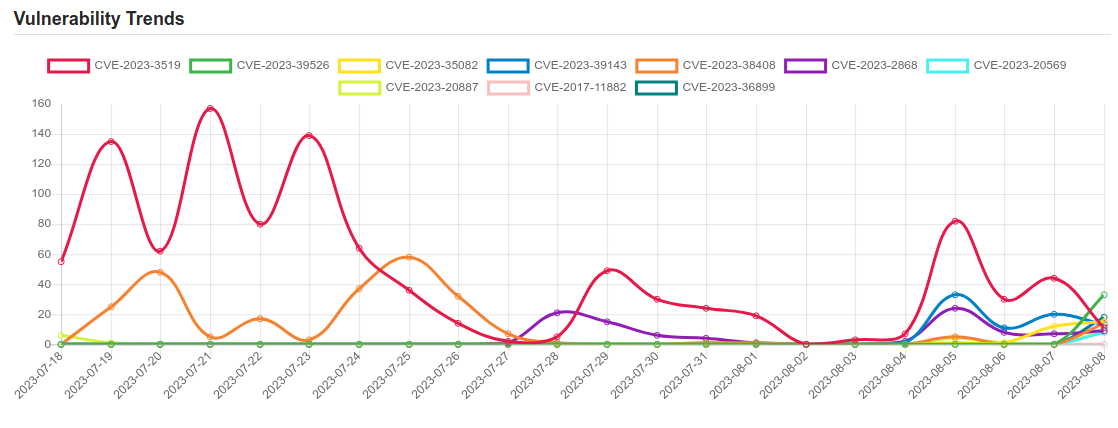Daily Vulnerability Trends: Wed Aug 09 2023

| CVE NAME | CVE Description |
| CVE-2023-39526 | PrestaShop is an open source e-commerce web application. Versions prior to 1.7.8.10, 8.0.5, and 8.1.1 are vulnerable to remote code execution through SQL injection and arbitrary file write in the back office. Versions 1.7.8.10, 8.0.5, and 8.1.1 contain a patch. There are no known workarounds. |
| CVE-2017-11882 | Microsoft Office 2007 Service Pack 3, Microsoft Office 2010 Service Pack 2, Microsoft Office 2013 Service Pack 1, and Microsoft Office 2016 allow an attacker to run arbitrary code in the context of the current user by failing to properly handle objects in memory, aka “Microsoft Office Memory Corruption Vulnerability”. This CVE ID is unique from CVE-2017-11884. |
| CVE-2023-36899 | ASP.NET Elevation of Privilege Vulnerability |
| CVE-2023-34034 | Using “**” as a pattern in Spring Security configuration for WebFlux creates a mismatch in pattern matching between Spring Security and Spring WebFlux, and the potential for a security bypass. |
| CVE-2023-38180 | .NET and Visual Studio Denial of Service Vulnerability |
| CVE-2023-35078 | Ivanti Endpoint Manager Mobile (EPMM), formerly MobileIron Core, through 11.10 allows remote attackers to obtain PII, add an administrative account, and change the configuration because of an authentication bypass, as exploited in the wild in July 2023. A patch is available. |
| CVE-2023-21651 | Memory Corruption in Core due to incorrect type conversion or cast in secure_io_read/write function in TEE. |
| CVE-2023-32019 | Windows Kernel Information Disclosure Vulnerability |
| CVE-2023-3519 | Unauthenticated remote code execution |
| CVE-2023-35082 | No description provided |
| CVE-2023-39143 | PaperCut NG and PaperCut MF before 22.1.3 on Windows allow path traversal, enabling attackers to upload, read, or delete arbitrary files. This leads to remote code execution when external device integration is enabled (a very common configuration). |
| CVE-2023-38408 | The PKCS#11 feature in ssh-agent in OpenSSH before 9.3p2 has an insufficiently trustworthy search path, leading to remote code execution if an agent is forwarded to an attacker-controlled system. (Code in /usr/lib is not necessarily safe for loading into ssh-agent.) NOTE: this issue exists because of an incomplete fix for CVE-2016-10009. |
| CVE-2023-2868 | A remote command injection vulnerability exists in the Barracuda Email Security Gateway (appliance form factor only) product effecting versions 5.1.3.001-9.2.0.006. The vulnerability arises out of a failure to comprehensively sanitize the processing of .tar file (tape archives). The vulnerability stems from incomplete input validation of a user-supplied .tar file as it pertains to the names of the files contained within the archive. As a consequence, a remote attacker can specifically format these file names in a particular manner that will result in remotely executing a system command through Perl’s qx operator with the privileges of the Email Security Gateway product. This issue was fixed as part of BNSF-36456 patch. This patch was automatically applied to all customer appliances. |
| CVE-2023-20569 | A side channel vulnerability on some of the AMD CPUs may allow an attacker to influence the return address prediction. This may result in speculative execution at an attacker-controlled?address, potentially leading to information disclosure. |
| CVE-2023-20887 | Aria Operations for Networks contains a command injection vulnerability. A malicious actor with network access to VMware Aria Operations for Networks may be able to perform a command injection attack resulting in remote code execution. |
A considerable amount of time and effort goes into maintaining this website, creating backend automation and creating new features and content for you to make actionable intelligence decisions. Everyone that supports the site helps enable new functionality.
If you like the site, please support us on “Patreon” or “Buy Me A Coffee” using the buttons below
To keep up to date follow us on the below channels.

